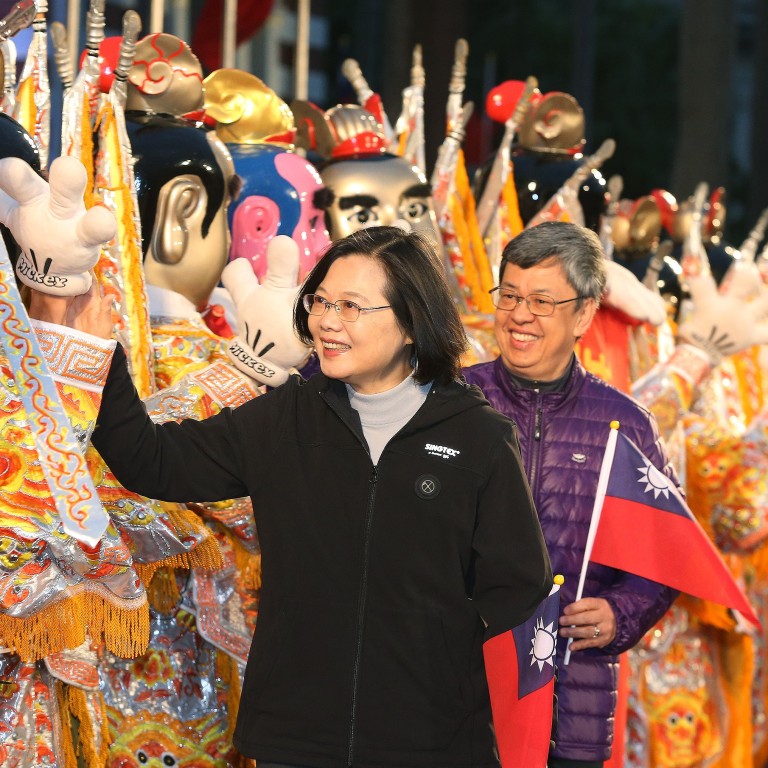
Taiwan president’s New Year address defends law aimed at Beijing influence
- President Tsai Ing-wen says anti-infiltration law will not hamper cross-strait activities nor impact on people’s freedoms
- Legislation criticised by Beijing’s Taiwan affairs office
In her remarks early on Wednesday, Tsai said the law passed by the legislature – where her independence-leaning Democratic Progressive Party’s (DPP) has the majority – a day earlier would not hamper activities between Taiwan and mainland China.
“We are anti-infiltration, not anti-exchange, so normal cross-strait exchanges and interactions will not be affected by this legislation, so the Taiwan businesspeople, students, and scholars in mainland China, all of those engaged in normal lives there will continue to do so without impact,” Tsai said.
“The anti-infiltration law must undergo court rulings, which will guarantee it will not impact Taiwanese people’s freedoms or infringe upon human rights and economic exchange, just allowing Taiwanese people’s democratic freedoms to be better protected.
“Safeguarding sovereignty, democracy, and freedom – this is the position that the Republic of China’s president must hold fast to.”
Beijing has long been accused of interfering in self-ruled Taiwan, which Beijing considers part of its own territory that must be one day brought under its fold.
The anti-infiltration law – which criminalises political activities backed by funding from “hostile external forces” in a reference to Beijing – has faced strong criticism from opponents, including those from the mainland-friendly Kuomintang (KMT), for serving as a “political tool” for the government ahead of the election.
There were fears in particular from the Taiwanese business community on the mainland that they could be targeted by the sweeping legislation.
Beijing’s Taiwan Affairs Office (TAO), which is in charge of policies related to the island, lashed out on Tuesday against the DPP, accusing the party – associated with the colour green – of imposing “green terror” for its own political and election interests and “damaging cross-strait exchange and creating hostility and confrontation across the strait”.
Beijing more confident than ever of Taiwan reunification, says official
Liu Jieyi, director of the TAO, said in a statement published on Wednesday in the Chinese Communist Party’s official Relations Across Taiwan Strait magazine that the party would stick to and perfect its “one country, two systems” model of semi-sovereignty for Taiwan with the goal of peaceful unification of the island with the mainland.
“Cross-strait relations have entered a new year, and walking down the path of peaceful development, Taiwanese compatriots will be able to fully enjoy ‘bonus’ blessings,” Liu wrote. “Conversely, if there are a small number of people who continue to create confrontation and hostility in cross-strait relations, then most Taiwanese counterparts’ interests and well-being will be seriously damaged.”
Concerns over Beijing’s perceived interference on the island have become a major part of the January 11 presidential and legislative elections, where Tsai is seeking re-election with a campaign focused on national security and sovereignty issues, amplified by pro-democracy protests in neighbouring Hong Kong.
“Democracy and authoritarianism are unable to coexist in the same country,” she said. “Hong Kong people have set an example to tell us that one country, two systems is absolutely not tenable.”
Cross-strait relations have frozen under Tsai’s administration, with talks between and Taipei and Beijing suspended, and increasing pressure from the mainland through squeezing Taiwan’s space in the international arena.
Asked on Wednesday if there was a time frame for restarting talks with Beijing, Tsai said it would be difficult to provide one given the “complex and changing situation”, but that there could not be political prerequisites for restarting talks with Beijing.
“In 2020, Taiwan will be a focal point for the world, and I hope that our country’s people can display courage and unity, to allow the radiance from democracy and freedom to again illuminate Taiwan and illuminate the world,” she said.

